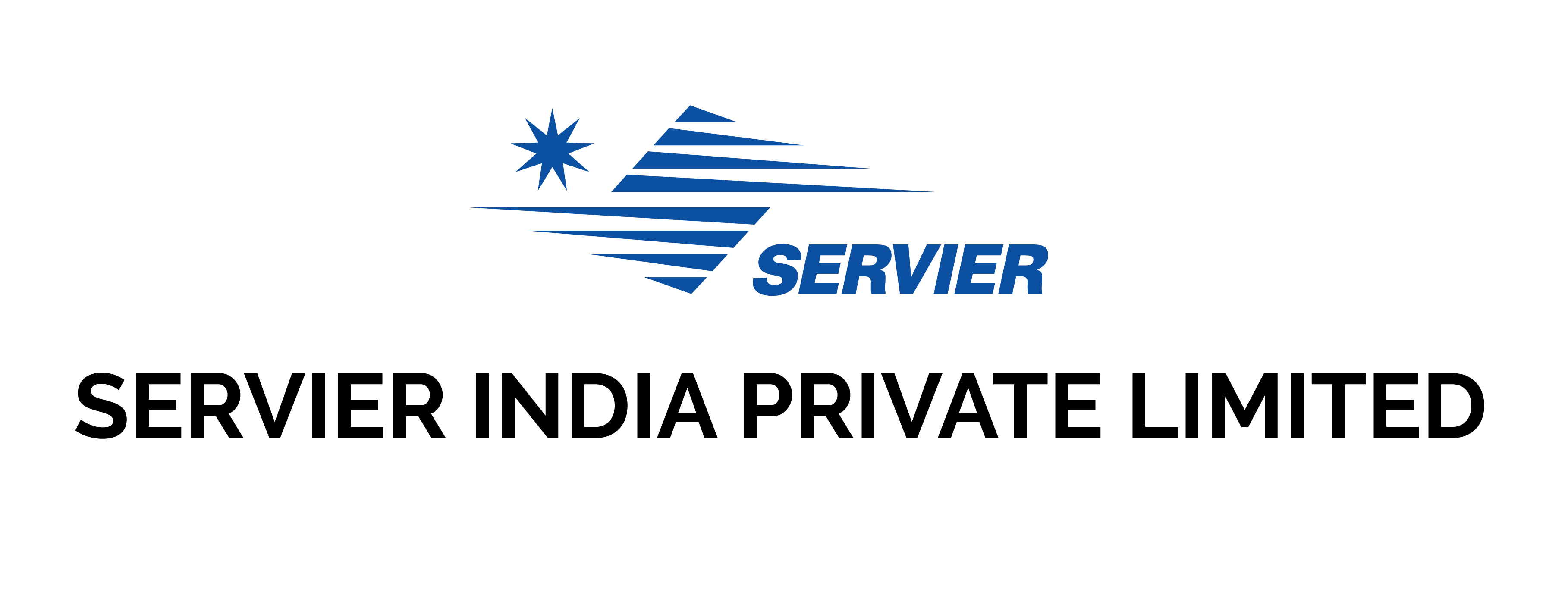What is a Heart Attack?
Our heart is a remarkable organ which is quite literally at the ‘heart’ of a tirelessly functioning and intricately designed system which keeps us alive.
A muscular organ which relentlessly pumps blood without a moment’s rest. The heart’s muscles called the cardiac muscles are strong and sturdy in order to fulfil our body’s continuous demand for oxygen-rich blood. Our cardiac muscles themselves require an optimum supply of blood to function well. Intricate pipes called the coronary arteries supply blood to our heart muscles.
However, if these blood vessels were to ever get completely blocked such that a region of the heart is totally deprived of blood supply, you will suffer from what is called a heart attack.

Such blockage of the coronary arteries can occur due to deposition of a plaque (a layer made of substances like fatty matter, calcium, proteins, and inflammatory cells) within them. Eventually, this plaque can rupture resulting in the formation of a blood clot (a mesh constituted of blood cells called platelets). If the blood clot completely blocks the coronary artery, the heart muscles to which it supplies blood will get starved of oxygen and the muscles start to die. This is a heart attack and the damage is permanent.
A heart attack is very often confused for a cardiac arrest. They are, however, two entirely different things, a heart attack is the blockage of an artery supplying blood to the heart, whereas a cardiac arrest is a sudden and unexpected loss of heart function (pumping). Both are medical emergencies and a heart attack could result in cardiac arrest.
Remember, a heart attack is a life-threatening emergency that requires quick action and immediate medical treatment. Do not ignore any form of chest pain, seek medical help immediately.
Symptoms
The symptoms of a heart attack and their severity may differ from person to person. Some heart attacks strike silently. However, most people get warning signs hours or days in advance. These warning signs must be heeded, and medical help must be sought to prevent any danger.
Common heart attack symptoms include:
The symptoms of a heart attack and their severity may differ from person to person. Some heart attacks strike silently. However, most people get warning signs hours or days in advance. These warning signs must be heeded and medical help must be sought to prevent any danger.

Discomfort in your chest region
A heart attack may start with discomfort in your chest region. Different people experience different sensations. Some describe it as a heaviness or a pressure, others call it a tightness or a squeezing sensation. While for some it manifests in the form of a sharp and shooting pain.
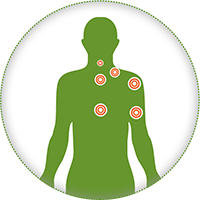
Pain that travels to the limbs
A characteristic of angina pain in the way in which it spreads. Usually, the pain or a dull ache may travel to the arms and then spread to the neck, shoulder, jaw, or back.
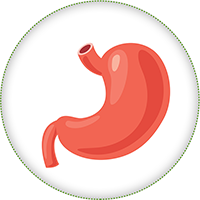
Abdominal symptoms
It is likely that some individuals may experience nausea, heartburn, or vomiting. Simply put, your stomach contents will feel like they are being churned.
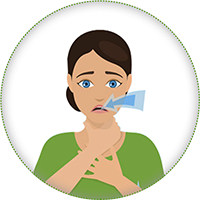
Shortness of breath
Many people have difficulty in breathing. You may feel as out of breath as when you have run a marathon or climbed a steep flight of stairs.

Excessive perspiration
During a heart attack, it is quite common to break into a cold sweat accompanied by clammy palms and feet.
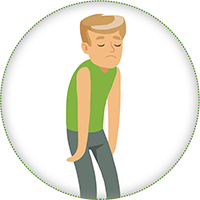
Unexplained tiredness
It doesn’t matter if you haven’t done much in the day, heart attacks are often accompanied by unexplained fatigue.

Sudden dizziness
You may experience a feeling of light-headedness or giddiness. This is because your heart is unable to pump enough blood to your brain.
Causes
The most common cause of a heart attack is oxygen starvation to a region of the heart muscles due to complete blockage of the coronary artery supplying blood to it.
Like the rest of the organs of your body, your heart too requires oxygen to function. Narrowing of the coronary artery (blood vessel supplying blood to the heart muscles) is narrowed or blocked. This blockage could occur due to the build-up a layer of fat, cholesterol, and other substances and such a layer is called a plaque. Overtime as the pressure within the blocked artery increases, the plaque may rupture, resulting in the formation of a blood clot. This blood clot could then block the artery resulting in complete blockage of blood supply to a specific region of the heart muscles. Eventually, the oxygen-starved muscles die and a heart attack is said to have occurred.
In some rare cases, the artery goes into a spasm due to unknown reasons and could cause a heart attack.
Risk factors
Certain factors are associated with an increased risk of a heart attack.

Diabetes:
Today, diabetes has become a household word in India, as its rise has been fuelled by a combination of genetics, increased stress, unbalanced nutrition, and an increasingly sedentary lifestyle. In uncontrolled diabetes, high levels of blood sugar can cause damage to the blood vessels thereby increasing one’s risk of suffering from a sudden heart attack. In fact the risk of a silent heart attack (an attack that strikes without any warning symptom) is especially high in diabetic patients.

High cholesterol levels:
Uncontrolled cholesterol levels have been associated with a higher risk of undergoing a heart attack. There are two types of cholesterol - HDL or good cholesterol and the LDL or the bad cholesterol. Cardiac risk is calculated by the ratio of LDL cholesterol over HDL cholesterol. You should aim to reduce your risk of suffering from a heart attack by increasing your body’s HDL cholesterol and you're decreasing it’s LDL cholesterol. You can do this by replacing polyunsaturated fats like butter, dalda and margarine with monounsaturated fats like olive oil, canola oil and by adding fatty fish, almonds and walnuts to your diet. However, please consult your physician/doctor before making any replacements or modifications to your diet. Triglycerides are another type of fat circulating in the blood. High levels of triglycerides are often associated with increased risk of heart problems. When there is too much cholesterol in the blood, it builds up within the walls of the arteries resulting in plaque formation. Over time, this build up causes damage to the arteries, sometimes leading to a heart attack.

Genetic make-up:
Unfortunately, Indians have been cursed with genes that predispose our bodies to fat deposition around our mid-torso region. Our genetic make-up increases our risk of developing heart disease. The risk of a heart attack goes up if you have a family history of the disease.

Hypertension:
Blood pressure is the pressure exerted upon the walls of your arteries by the blood, with each pump of the heart High blood pressure can put unnecessary strain on the heart as it puts your heart under additional stress. Hence it is vital to get your BP monitored regularly. Try to control your blood pressure with proper treatment, salt reduction, and stress management.

Obesity:
Excess weight can not only be a burden for the weighing scale, but also for your heart. Try to be as close as possible to your ideal weight to ward off risks of a heart attack. It is important to manage your weight in the right way without trying baseless fad diets or taking untested supplements.
Tips to weight management

Set realistic weight loss goals

Replace take-away and instant meals with fresh homecooked meals

Load up on raw salads, fruits, whole grains, and legumes

Snack on nuts and seeds instead of fried snacks and baked goods

Reduce portion size and the number of helpings

Nurture active hobbies like trekking, team sports or gardening

Be active, get a minimum of 30 minutes of physical activity at least five days a week

Smoking:
Smoking can literally burn out your heart health and put you at increased risk of a fatal heart attack by damaging your blood vessels and decreasing the amount of oxygen in your blood. Go off this habit to safeguard your heart. Second-hand smoke can also be dangerous as it can increase the stickiness of the platelets and can damage your blood vessels. Try to avoid being around smokers if you want to protect your heart.

Sleeplessness:
Most people need six to eight hours of sleep each day. Poor sleep quality is linked to an increased risk of high blood pressure which is a potential cause of heart disease. People who work in shifts or sleep less are at an increased risk for a heart attack.

Work stress:
Stress is the trigger behind many health conditions including heart attacks. While stress is unavoidable, what can be controlled is your response to stress. This can be achieved through meditation, breathing exercises like pranayama, relaxation techniques, and yoga.
Know the difference in angina and heart attack
When a small fire begins in your kitchen, the smoke detector goes off – a warning signal for you to do the needful and prevent the fire from getting worse. Consider angina pain to be the warning signal – an indication that your coronary artery is partially blocked and your heart needs more oxygen to function. If you were to ignore this warning, the coronary artery would, over time, get completely blocked. The result? Total loss of blood supply to a region of your heart muscles, in short, you will experience a heart attack. Thus, simply put, angina is the predecessor to a heart attack, a symptom in itself, that should not be taken likely.
There is however an overlap of symptoms between angina and heart attack.
Discomfort
Tightness
Burning
Squeezing
Cold sweat
Heartburn
Breathlessness
Unusual fatigue
Pressure or heaviness
Crushing or gripping chest pain
Chest pain that travels to the neck, arms, jaw, back, or shoulders
So how do you know whether you are receiving the warning signal or whether you are dangerously close to experiencing the main event? There is a major difference that would help you differentiate between angina and heart attack.
- Pain associated with stable angina goes away upon resting
- If the pain persists then you may be suffering from unstable angina, a more serious form of angina that can result in a heart attack

It is important to have any type of chest pain thoroughly evaluated to diagnose if there is a serious issue that should be fixed BEFORE a heart attack occurs.
Only a doctor can tell if your chest pain is a bout of angina or a severe heart attack with the help of tests like an electrocardiogram (ECG), treadmill exercise or other stress tests, cardiac enzyme blood tests, and imaging of the coronary arteries (angiogram).
Irrespective of whether it is angina or a heart attack, one ought not to take a chance. If you experience any of the above symptoms immediately seek medical attention.

